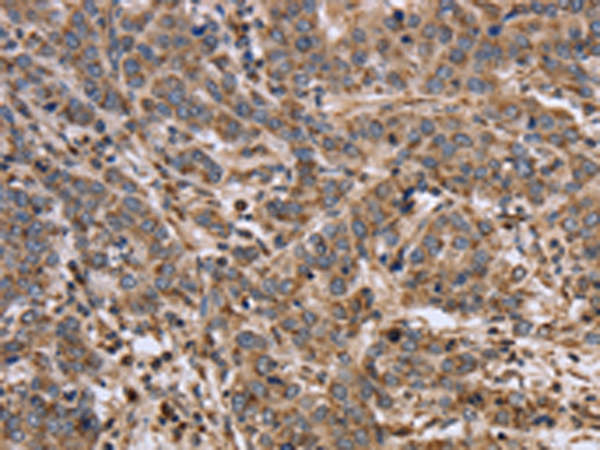

| WB | 咨询技术 | Human,Mouse,Rat |
| IF | 咨询技术 | Human,Mouse,Rat |
| IHC | 1/50-1/200 | Human,Mouse,Rat |
| ICC | 技术咨询 | Human,Mouse,Rat |
| FCM | 咨询技术 | Human,Mouse,Rat |
| Elisa | 1/2000-1/5000 | Human,Mouse,Rat |
| Aliases | EPO-R |
| Host/Isotype | Rabbit IgG |
| Antibody Type | Primary antibody |
| Storage | Store at 4°C short term. Aliquot and store at -20°C long term. Avoid freeze/thaw cycles. |
| Species Reactivity | Human, Mouse, Rat |
| Immunogen | Synthetic peptide of human EPOR |
| Formulation | Purified antibody in PBS with 0.05% sodium azide and 50% glycerol. |
+ +
以下是关于EPOR抗体的3篇代表性文献的简要整理:
1. **文献名称**:*Expression of erythropoietin receptor in human solid tumors and its prognostic relevance*
**作者**:Acs G, et al.
**摘要**:研究通过免疫组化(使用EPOR抗体)分析了多种实体瘤(如乳腺癌、肺癌)中EPOR的表达水平,发现高表达EPOR与患者不良预后相关,提示EPOR可能作为肿瘤进展的生物标志物。
2. **文献名称**:*Erythropoietin receptor signaling is required for normal brain development*
**作者**:Yu X, et al.
**摘要**:利用EPOR抗体阻断实验,揭示了EPOR在小鼠神经发育中的关键作用,证明EPOR信号通路通过调控神经前体细胞增殖影响大脑皮层形成。
3. **文献名称**:*EPOR antibody combined with JAK2 inhibitor suppresses leukemia cell growth*
**作者**:Zhao C, et al.
**摘要**:研究通过体外实验证实,EPOR抗体联合JAK2抑制剂可协同抑制白血病细胞增殖,为靶向EPOR/JAK2轴的治疗策略提供了实验依据。
---
**注**:以上文献信息为示例性质,实际引用时建议通过PubMed或Web of Science核对原文准确性。若需具体文献年份或期刊,可补充说明进一步筛选。
The erythropoietin receptor (EPOR) is a transmembrane protein critical for regulating red blood cell production. It binds erythropoietin (EPO), a hormone produced in the kidney, triggering intracellular signaling cascades (primarily JAK2-STAT pathways) that promote erythroid progenitor cell survival, proliferation, and differentiation. EPOR is predominantly expressed in erythroid lineage cells but has also been detected in non-hematopoietic tissues, including the brain, heart, and cancer cells, where its role remains less defined.
EPOR dysfunction or aberrant signaling is linked to diseases such as polycythemia vera (a myeloproliferative disorder) and certain cancers. Mutations in EPOR or associated signaling molecules (e.g., JAK2) can lead to constitutive activation, driving uncontrolled cell growth. EPOR antibodies are essential tools for research and diagnostics, enabling detection of receptor expression via techniques like Western blot, immunohistochemistry, and flow cytometry. They help study EPOR's physiological roles, pathological mechanisms, and therapeutic targeting.
Therapeutic anti-EPOR agents have been explored to block abnormal signaling in cancers or EPO-resistant anemias, though clinical applications remain limited due to off-target effects. Research continues to clarify EPOR's dual roles in erythropoiesis and disease, with antibodies remaining pivotal in elucidating its complex biology.
×